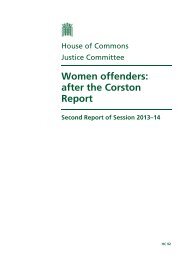Minority voices: Research into the access and acceptability of ... - MMC
Minority voices: Research into the access and acceptability of ... - MMC
Minority voices: Research into the access and acceptability of ... - MMC
- No tags were found...
You also want an ePaper? Increase the reach of your titles
YUMPU automatically turns print PDFs into web optimized ePapers that Google loves.
The study recommendations are:• The lack <strong>of</strong> awareness <strong>and</strong> underst<strong>and</strong>ing <strong>and</strong> <strong>the</strong> poor perception <strong>of</strong> services thatpromote mental health, amongst many young people from minority ethnic groups <strong>and</strong><strong>the</strong>ir parents, must be addressed. New sources <strong>of</strong> information about CAMHS need to bedisseminated more widely, including through ‘non-traditional’ routes that young peoplemay be more interested in using such as <strong>the</strong> internet, media/radio <strong>and</strong> through localsocial <strong>and</strong> faith groups. It will be important to ensure that this information is availablein a variety <strong>of</strong> languages, addresses <strong>the</strong> information needs <strong>of</strong> parents <strong>and</strong> isaccompanied by education <strong>and</strong> training at <strong>the</strong> primary care level to improve <strong>the</strong> earlyrecognition <strong>of</strong> mental health difficulties <strong>and</strong> <strong>the</strong> appropriate referral on to CAMHS.• Within CAMHS, underst<strong>and</strong>ing <strong>of</strong> different cultural <strong>and</strong> religious needs is stillvariable <strong>and</strong> requires attention. The provision <strong>of</strong> training to address CAMHS stafflimitations in <strong>the</strong>se areas is needed, including developing <strong>the</strong> knowledge base onculturally competent practice <strong>and</strong> methods for evaluating this.• The important role <strong>of</strong> <strong>the</strong> voluntary sector needs to be recognised <strong>and</strong>developed. This includes: building effective partnerships between CAMHS/healthservice providers <strong>and</strong> voluntary sector providers; involving <strong>the</strong> voluntary sector in <strong>the</strong>commissioning <strong>of</strong> services; sharing good practice <strong>and</strong> crucially, attention being given toproviding more sustainable funding <strong>of</strong> voluntary sector projects.• CAMH services need to explore options for developing more flexible <strong>and</strong>proactive approaches to <strong>the</strong>ir delivery. Whilst many CAMHS are struggling withincreasing dem<strong>and</strong> around <strong>the</strong> country <strong>the</strong>re are examples <strong>of</strong> innovative practice thatindicate <strong>the</strong>re is scope for improvement <strong>and</strong> greater flexibility despite <strong>the</strong>se pressures.The importance <strong>of</strong> timing, <strong>of</strong> young people being able to build up trust in <strong>the</strong> staffmember <strong>the</strong>y are seeing, <strong>and</strong> providing continuity <strong>of</strong> care, are o<strong>the</strong>r issues requiringattention.<strong>Minority</strong> Voices <strong>Research</strong> Report44
















